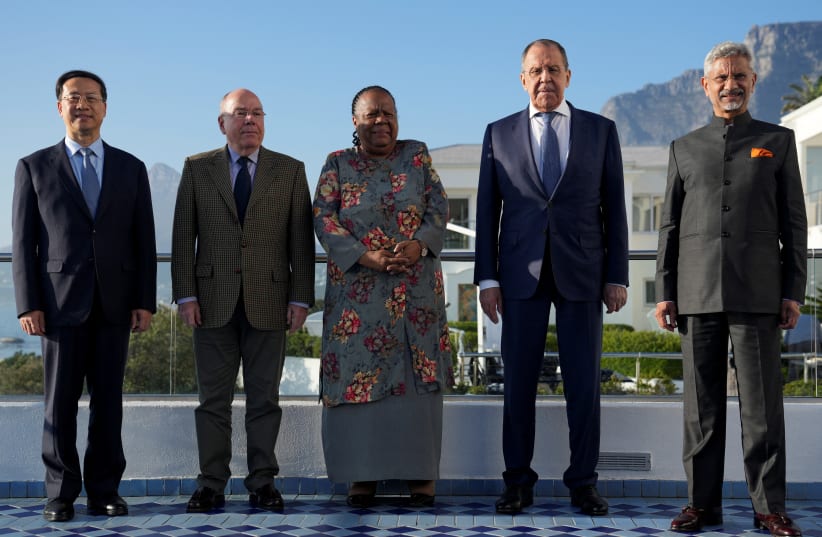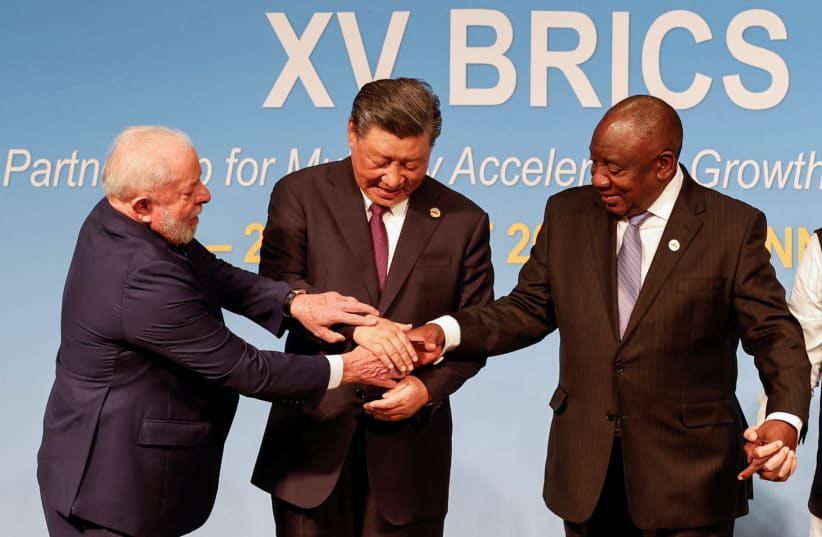Iran, Saudi Arabia, the UAE, and Egypt are the latest countries to join BRICS, implying some very drastic dynamic shifts in the region.
SETH J. FRANTZMAN JANUARY 3, 2024 16:26
Updated: JANUARY 3, 2024 16:32

China’s Vice Foreign Minister Ma Zhaoxu, Brazil’s Foreign Minister Mauro Vieira, South Africa’s Foreign Minister Naledi Pandor, Russia’s Foreign Minister Sergei Lavrov and India’s Foreign Minister Subrahmanyam Jaishankar attend a BRICS foreign ministers’ meeting in Cape Town, South Africa, June 1.(photo credit: Nic Bothma/Reuters)Iran, Saudi Arabia, the UAE, and Egypt all joined BRICS, an economic group that has increasing clout in the region, earlier this week.
BRICS already includes Brazil, Russia, India, China, and South Africa. This group of countries is significant as it provides a forum for the coalition to share views and work together. As such, it is beneficial for countries in the region to join BRICS. However, the fact that several of these countries have been hostile to Israel and also have not condemned the Hamas attack on October 7 illustrates how this expansion could affect Israel.
BRICS expansion in the region makes sense
The decision by Middle East countries to join groupings like BRICS is natural. Some of the same countries have also joined the SCO, which is linked to China. These countries enter coalitions with the intent of balancing ties with the West. On the other hand, countries like Iran want to get around sanctions.
This new expansion of BRICS has doubled its membership. While the West has tended to believe the Middle East is of declining importance, many other countries see the region as just the opposite. This signifies a clear shift in global dynamics. For instance, the US wants to pivot to confronting “near-peer adversaries,” such as China and Russia. As such, the US wants to draw down its role in the Middle East. The “near-peer adversaries,” meanwhile want to increase their role in the region. For instance, China does a lot of outreach to Iran and the Gulf, while Russia acquires Iranian drones. Russia also has a large role in Syria. This means the “near-peer” countries are ready to fill the void if the US reduces its role in the region.
A huge boost to the Arab world’s economy
“The expansion of the BRICS bloc to include Saudi Arabia and the UAE is expected to offer new investment opportunities for the Arab world’s two largest economies while boosting the group’s influence globally,” analysts said, according to The National in the UAE.

“Expansion of the Brics multilateral bloc to include Saudi Arabia and UAE augurs extremely well amid ongoing geopolitical and economic challenges confronting the world economy,” Ullas Rao, assistant professor of finance at Edinburgh Business School of Heriot-Watt University in Dubai, said.
Iranian media also applauded the new relationship. Iran is also seeking to increase its global influence. It also backs proxies and terror groups that destabilize the region. For instance, the Iran-backed Houthis have attacked ships in the Red Sea, harming the global economy. Russia and China have not condemned the attacks, meaning that BRICS is also a way for countries that may destabilize the region to receive legitimacy. Nevertheless, the attacks in the Red Sea should concern Saudi Arabia, the UAE, and Egypt, which also joined BRICS.
Iran sees many opportunities in its new role, according to the reports at Fars News.
Content retrieved from: https://www.jpost.com/international/article-780601?fbclid=IwAR2bkcU7xhlnaEigabq1z80eJ1ocsV3eKwmWRz50afnH-1DZAFrYXOWL3Ps.